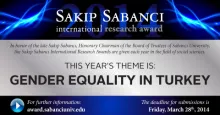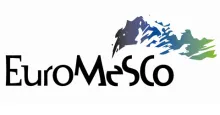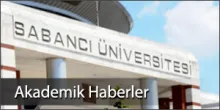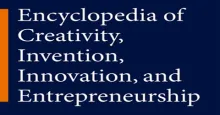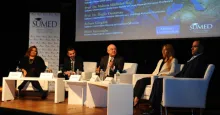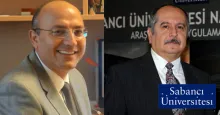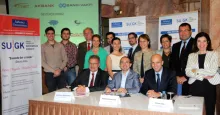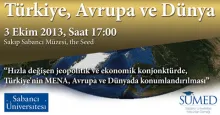Sabancı University inaugurates the “Entrepreneurship Council” with programs supported by TTNET, Akbank and the Sabancı Foundation
Sabancı University, named “Turkey’s Most Entrepreneurial and Innovative University” on the University Entrepreneurship and Innovation Index published by the Turkish Ministry of Science, Industry and Technology for the first time in 2012, prepares to collect entrepreneurial activities maintained since its establishment under one roof.
This will be achieved by the inauguration of the “Sabancı University Entrepreneurship Council.” A press conference was held to share current and planned entrepreneurship activities and announce international cooperation projects.

Speaking at the conference were Sabancı University President Professor Nihat Berker as well as executives of companies that will be strategic partners in various projects to be undertaken by the Entrepreneurship Council: TTNET General Manager Abdullah Orkun Kaya and Akbank Assistant General Manager Bülent Oğuz. During introductory remarks, President Nihat Berker said that Sabancı University started off with the objective to establish a global university in Turkey, maintaining an approach of interdisciplinary education, teaching, research and application since its first academic year in 1999 – 2000. Explaining that the philosophy of “to create and develop together” led to research-based entrepreneurship at Sabancı University, Berker continued: “We established the Entrepreneurship Council to gather our efforts under one umbrella structure and develop them with the leading institutions in Turkey and around the world. We enable all students to graduate with a minor in entrepreneurship in addition to their majors. We are developing our cooperation with MIT on entrepreneurship with the support of TTNET, and will be adding the Social Entrepreneurship Program in association with the Sabancı Foundation to the current Entrepreneur Development Program that we maintain with contributions by Akbank. We will select best student and entrepreneur projects in the Entrepreneurship Council and provide them with pre-incubation support.”
Speaking next, TTNET General Manager Abdullah Orkun Kaya said, “We believe that Turkey’s digital transformation will be possible through investments in innovative ideas. Solutions based on digital innovation will play the leading role in the sustainable development of the country. We have opened our doors to young entrepreneurs so that Turkey creates exemplary digital solutions and writes success stories. We and the previous generations have always been warned by our elders not to ‘invent things.’ Now, we make a call to everyone with business ideas to come forward and invent best as they can. We provide mentorship to budding entrepreneurs with teams experienced in business development and investment.”
Kaya continued, “We are proud to announce our cooperation with Sabancı University, one of Turkey’s highly prestigious education institutions thanks to its achievements in entrepreneurship, leadership in technology development, and globally-focused activities. Together with Sabancı University, we have sent a student team whose entrepreneurship project idea was found promising to the Global Founders’ Skills Accelerator (GFSA) program in MIT, where I too have my MBA degree. This makes me doubly proud as MIT is known for its innovation and entrepreneurship ecosystem. We will continue to increase our collaboration with Sabancı University for the advancement of these areas in Turkey.”
Bülent Oğuz, Vice President of Small and Medium Business Banking at Akbank, a corporate sponsor of the Sabancı University Entrepreneur Development Program since its beginning in 2003, said “Entrepreneurs play an active role in the creation of new thoughts and birth of new industries by analyzing consumer needs as quickly and accurately as possible, bringing momentum to the economy of which they are a part.”
Pointing out that entrepreneurs are the drivers of economic growth with their contribution to production, Oğuz continued, “We believe that as entrepreneurship becomes widespread in Turkey, our competitiveness in the international market will improve, and the transformation of our economy to a medium- and high-technology manufacturing economy will be aided by the innovative projects and companies of our entrepreneurs, who will champion the culture of innovation in business. This is why supporting entrepreneurship with its rightful place among the key drivers of growing economies is critical for us. We assist our entrepreneurs with new products, services, funding models, training programs, competitions and cooperations so that all new enterprises evolve into successful SMBs of the future. As Akbank, we are in close cooperation with the host of this conference today, the Sabancı University Entrepreneurship Council. This year, we have added the “Social Entrepreneur Development Program” to the “Entrepreneur Development Program” we have been conducting with Sabancı University. We hope that entrepreneurs will further grow their businesses and gain even better momentum in the business world of tomorrow.”
Sabancı Foundation General Manager Zerrin Koyunsağan sent a written message, saying “As Sabancı Foundation, we firmly believe in the importance of the civil society, foundations and associations, or the ‘third sector,’ for social development. Institutionalization is critical for a more active civil society. The trainings offered by the Sabancı University Social Entrepreneur Development Program will make crucial contributions to institutional capacity development in the third sector. We will also extend grants to social entrepreneurs chosen within the Sabancı Foundation’s Changemakers initiative to participate in the program and INSEAD’s International Social Entrepreneurship Conference. This will enable our Changemakers to receive additional training and to join the international network of social entrepreneurs. We are glad to be making a contribution to the development of social entrepreneurship, therefore the civil society in Turkey, and would like to see Sabancı University extend and expand their efforts in this area.”
The conference concluded with a presentation by Sabancı University Entrepreneurship Council Director Kutlu Kazancı, who pointed out significant changes in the entrepreneurship ecosystem in Turkey and on a global scale, and gave examples of local and international best practices. Kutlu Kazancı explained that entrepreneurship courses have been offered at Sabancı University since 1999.
Sabancı University established one of Turkey’s first technology transfer offices
In 2002, Sabancı University established the Research and Graduate Policy Directorate and one of Turkey’s first technology transfer offices. The university was a founding partner of the Gebze Organized Industrial Zone Technology Park, and initiated the Entrepreneur Development Program with Akbank in 2003. Turkey’s first technology transfer company Inovent was founded within Sabancı University in 2006. So far, Inovent has helped the establishment of almost 30 startups and 4 companies, one of which received an investment of USD 4 million from foreign funds. The first doctorate degree in entrepreneurship was awarded in 2009.
The Sabancı University Entrepreneurship Council was founded to act as an umbrella for all entrepreneurship activities and to enable students, researchers, alumni and entrepreneurs to learn, gain insight, apply their ideas and become a part of the ecosystem. A minor in entrepreneurship is offered to all students. Other initiatives include the Entrepreneurship Development Program with Akbank and the Social Entrepreneur Development Program with Akbank and the Sabancı Foundation. A series of seminars will be held that are open to students and the public. The Entrepreneurship Council will assist the activities of the Sabancı University Technology Transfer Office, which was one of the 10 Technology Transfer Offices that received TÜBİTAK support in 2013 as part of the Technology Transfer Office Support Program. The Office will be a part of Research and Graduate Policy.
Examples of successful entrepreneurship at Sabancı University
During his presentation at the conference, Kutlu Kazancı gave examples of international cooperations and successful entrepreneurship initiatives at Sabancı University. With the support of TTNET, the University cooperated with MIT for participation in the Global Founders’ Skills Accelerator Program. A team of three was sent to this three-month program this summer with their work in the Somatech Project for social media analysis. The team won a prize of 14,000 US dollars. The cooperation will continue with a team to be chosen among pre-incubation teams every summer.
Another cooperation is with the National University of Singapore’s Entrepreneurship Summer School. Three Sabancı University students who were part of the Inovatink project to provide robotic learning kits to students spent the month of July in Singapore and came home with first prize.
Furthermore, Professor Aytül Erçil of the Faculty of Engineering and Natural Sciences was named the “Entrepreneurial Woman of Turkey 2013” by the Society for Supporting Female Entrepreneurs (KAGİDER) for her development of the business idea of the Vistek- İsra joint venture on artificial sight technologies..
Best pre-incubation projects are sent to MIT and Singapore
The pre-incubation center called “SUCOOL” will choose innovative projects that meet a need in the market and are implemented by good teams to provide mentorship, pre-incubation, business development, virtual board of directors and office support until the summer. Projects that successfully complete SUCOOL and are considered ready to evolve into businesses and generate revenue will have priority in the Inovent Incubation Center. The best projects to emerge from incubation will receive grants to visit MIT and Singapore.
The future objective of the SU Entrepreneurship Council is to ensure that each student at Sabancı University takes part in and completes at least one project prior to graduation. The purpose is to support exciting projects that lie at the intersection of Sabancı University research areas, market needs, and the talents and interests of students and entrepreneurs.


